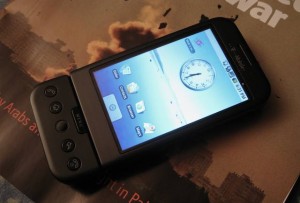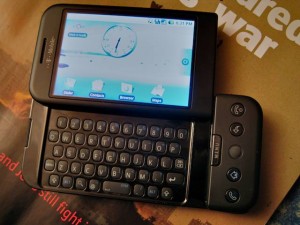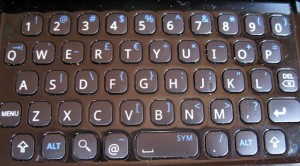Sigh. My Google phone is on its way back to T-Mobile. I write this with some regret, because I had high hopes for it. My GPRS BlackBerry (which is by far the best phone I’ve ever had) was beginning to show signs of physical collapse. And I was really tired of trying to access Google via GPRS, which was like going back to the bad old days of dial-up modems. So I thought: what I need is a proper 3G phone.
But which one? The BlackBerry Storm was considered and discarded, even before Stephen Fry demolished it. To me, it looked like something rushed out to compete with the iPhone, but without proper testing. As an iTouch user, I knew and liked the iPhone interface, but felt that I ought to make a stand because of its non-generativity (to use Jonathan Zittrain’s phrase). So how about the Google Android phone?
Research showed that it was offered by T-Mobile (my network provider). And it met Jonathan’s requirement for open-ness. So I ordered one.
It seemed slick enough at first sight. Setting it up to link with my Google account was a breeze. And it had a real QWERTY keyboard, accessible by sliding the screen up, thus:
The keyboard, though small, was useable in twin-thumb mode, just as the Psion PDAs used to be.
So how was it in practice? Answer: mixed. Very mixed. Battery life (like that of the iPhone) is abysmal if one has the phone permanently online, so I turned everything off and just synchronised Gmail when I needed to update. The camera is, well, dire. The GPS facility is good — really good, actually; but it positively eats battery-life. All of which tended to reduce the phone to a rather more humdrum piece of kit. The biggest problem was that its methods of indicating that messages have arrived was, for me, useless — especially compared with the BlackBerry’s ways of doing things. I need to know instantly when messages have arrived — especially when the phone is on silent. (I spend a lot of time in meetings.)
Composing and typing SMS messages on the G-phone is a tedious palaver. First you have to swing out the screen so that you can type. This requires two hands. So effectively texting on the move is difficult/impossible.
The Android software seems stable and effective. The Apps available on the open ‘market’ are, however, pretty tame compared with what’s available for the iPhone. This may change in time and more handsets become available and the commercial opportunities for Android Apps begins to build. But for now the first G-phone available on the UK market is IMHO just an unsatisfactory beta. If it had come out before the iPhone we would have regarded it as a small miracle. But now it doesn’t cut the mustard. What Android really needs is a slick handset from Nokia or Sony-Ericsson.
So I’m returning to the BlackBerry fold. What the episode has taught me is that easy, efficient SMS and email are the key things I need, plus occasional 3G-speed access to web sites.
Ironically, I will be acquiring a new BlackBerry just as Barack Obama has to surrender his.



